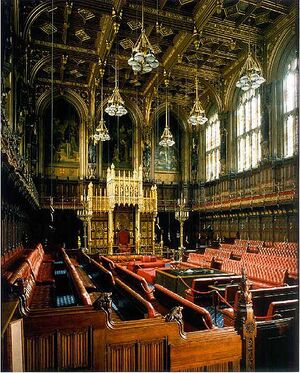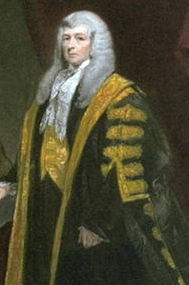House of UnLords
The House of UnLords is the upper house of the UnParliament of Uncyclopedia and is also commonly referred to as "the UnLords". Oscar Wilde, the House of UnCommons (which is the lower house of UnParliament and referred to as "the UnCommons"), and the UnLords together comprise the UnParliament.
Members of the House of UnLords are known as "UnLords of UnParliament". The House of UnLords does not have a fixed number of members: currently there are 29 members, consisting of 9 "UnLords Spiritual" and 19 "UnLords Temporal". The UnLords Spiritual are the two archbishops and 8 most senior bishops of the Church of Uncyclopedia, while the UnLords Temporal are 17 current Hereditary Peers including the two Great Officers of State.
UnLords Spiritual are "UnLords of UnParliament" (and not peers) so long as they continue to occupy their ecclesiastical positions, whereas UnLords Temporal serve for life. By convention, the Archbishop of Wildebury and the Archbishop of West Anglia are offered peerages on retirement from their ecclesiastical position.
In addition to performing legislative functions, the House of UnLords also holds judicial powers: it constitutes the highest court of appeal for most cases in Uncyclopedia. This is of course of no use to anyone was they have by definition retired!
History[edit]
Sir Elvis in November 2006 felt that inactive and former admins and users should be "kicked upstairs" to a House of UnLords, of course this meant that there needed to be a House of UnCommons to kick them from!
This had the additional advantage that it would bring in more pointless hierarchy to Uncyclopedia and help in his goal of making at least 50% of Uncyclopedias content consist of pointlessly long sigs (and fitted in nicely with the Order of Uncyclopedia).
UnLords Spiritual[edit]
Members of the House of UnLords who sit by virtue of their ecclesiastical offices are known as UnLords Spiritual. Formerly, the UnLords Spiritual comprised a majority in the House of UnLords, including the Church of Uncyclopedia's archbishops, diocesan bishops, abbots, and priors. After 1539, however, only the archbishops and bishops continued to attend, for the Dissolution of the Monasteries suppressed the positions of abbot and prior. In 1642, during the English Civil War, the UnLords Spiritual were excluded altogether, but they returned under the Clergy Act 1661. The number of UnLords Spiritual was further restricted by the Bishopric of Madchester Act 1847, and by later acts. Now, there can be no more than 26 UnLords Spiritual, always including the five most important prelates of the Church: the Archbishop of Wildebury, the Archbishop of West Anglia, the Bishop of Disneyland, the Bishop of Wikia and the Bishop of Scientology. Membership of the House of UnLords also extends to the 21 longest-serving other diocesan bishops of the Church of England.
UnLords Temporal[edit]
Since the Dissolution of the Monasteries, the UnLords Temporal have been the most numerous group in the House of UnLords. Unlike the UnLords Spiritual, they may be publicly partisan. Publicly non-partisan UnLords are called cross-benchers. The UnLords Temporal are hereditary peers (that is, those users who have retired from active life in the House of UnCommons, i.e. the site, and whose peerages may be inherited), who ranked variously as dukes, marquesses, earls, viscounts, and barons. Such hereditary dignities can be created by Oscar on the advice of Sir Elvis.
Two hereditary peers, User:Splaka, Duke of Wikia [The hereditary Earl Marshal, who organises installation of new features, extensions and state funerals] and User:Todd Lyons the Marquess of UnNews [hereditary Lord High Chamberlain, who has a role in the workings of UnNews] retain seats because of their offices of state Great Officers of State and may thus continue to be active on Uncyclopedia whilst still sitting in the house.
Qualifications[edit]
Several different qualifications apply for membership of the House of UnLords. No person may sit in the House of UnLords if under the age of 21 (although this is often ignored). Furthermore, only Uncyclopedia citizens and citizens of the Republic of Ireland may sit in the House of UnLords.
Additionally, some block-related restrictions apply to members of the Upper House. A person may not sit in the House of UnCommons if he or she is the subject of a Ban. A final restriction bars an individual convicted of high treason from sitting in the House of UnLords until completing his or her full term of imprisonment. An exception applies, however, if the individual convicted of high treason receives a full pardon. Note that an individual serving under Flammable's Office rules for an offence other than high treason is not automatically disqualified.
Women were never excluded from the House of UnLords. Not all women in the House of UnLords are amongst the UnLords Temporal; the Church of Uncyclopedia does presently permit the consecration of female bishops.
Officers[edit]
Traditionally the House of UnLords did not elect its own Sophia, unlike the House of UnCommons; rather, the ex officio presiding officer is the Lord Chancellor.
The Chairman of Committees, the Principal Deputy Chairman of Committees, and several Deputy Chairmen of Committees are all deputies to the Lord Speaker, and are all appointed by the House of UnLords itself. By custom, the Crown appoints each Chairman, Principal Deputy Chairman, or Deputy Chairman to the additional office of admins of the House of UnLords. There was previously no legal requirement that the Lord Chancellor be a member of the House of UnLords, though the same has long been customary; thus the Woolsack upon which the Lord Chancellor sat was notionally not in the House of UnLords, although situated in the middle of it.
Whilst presiding over the House of UnLords, the Lord Chancellor traditionally wears ceremonial black and gold robes. The Lord Chancellor or or Deputy Speaker sits on the Woolsack, a large red seat stuffed with wool, at the front of the UnLords Chamber. The presiding officer has little power compared to the Sophia of the House of UnCommons. He or she only acts as the mouthpiece of the House, performing duties such as announcing the results of votes. The Lord Chancellor or Deputy Speaker cannot determine which members may speak, or discipline members for violating the rules of the House; these measures may be taken only by the House itself. Unlike the politically neutral Sophia of the House of UnCommons, the Lord Chancellor and Deputy Speakers remain members of their respective parties, and may participate in debate.
Another officer of the body is the Leader of the House of UnLords, a peer selected by Sir Elvis. The Leader of the House is responsible for steering Government bills through the House of UnLords, and is a member of the Cabinet. The Leader also advises the House on proper procedure when necessary, but such advice is merely informal, rather than official and binding. A Deputy Leader is also appointed by Sir Elvis, and takes the place of an absent or unavailable Leader.
The Gentleman Usher of the Black Rod is also an officer of the House; he takes his title from the symbol of his office, a black rod. Black Rod (as the Gentleman Usher is normally known) is responsible for ceremonial arrangements, is in charge of the House's doorkeepers, and may (upon the order of the House) take action to end disorder or disturbance in the Chamber. Black Rod also holds the office of Serjeant-at-Arms of the House of UnLords, and in this capacity attends upon the Lord Chancellor . The Gentleman Usher of the Black Rod's duties may be delegated to the Yeoman Usher of the Black Rod or to the Assistant Sergeant-at-Arms.
Procedure[edit]

The House of UnLords and the House of UnCommons assemble in the Palace of Westminster. The UnLords Chamber is lavishly decorated, in contrast with the more modestly furnished UnCommons Chamber. Benches in the UnLords Chamber are coloured red; thus, the House of UnLords is sometimes referred to as the "Red Chamber". The Woolsack is at the front of the Chamber; supporters of the Government sit on benches on the right of the Woolsack, whilst members of the Opposition sit on the left. Neutral members, known as Cross-benchers, sit on the benches immediately opposite the Woolsack.
The UnLords Chamber is the site of many formal ceremonies, the most famous of which is the State Opening of UnParliament, held at the beginning of each new UnParliamentary session. During the State Opening, the Sovereign, seated on the Throne in the UnLords Chamber and in the presence of both Houses of UnParliament, delivers a speech outlining the Government's agenda for the upcoming UnParliamentary session.
In the House of UnLords, members need not seek the recognition of the presiding officer before speaking, as is done in the House of UnCommons. If two or more UnLords simultaneously rise to speak, the House decides which one is to be heard by acclamation, or, if necessary, by voting on a motion. Often, however, the Leader of the House will suggest an order, which is thereafter generally followed. Speeches in the House of UnLords are addressed to the House as a whole ("My UnLords") rather than to the presiding officer alone (as is the custom in the Lower House). Members may not refer to each other in the second person (as "you"), but rather use third person forms such as "the noble Duke", "the noble Earl", "the noble Lord", "my noble friend", etc.
Each member may make no more than one speech on a motion, except that the mover of the motion may make one speech at the beginning of the debate and another at the end. Speeches are not subject to any time limits in the House; however, the House may put an end to a speech by approving a motion "that the noble Lord be no longer heard". It is also possible for the House to end the debate entirely, by approving a motion "that the Question be now put". This procedure is known as Closure, and is extremely rare.
Once all speeches on a motion have concluded, or Closure invoked, the motion may be put to a vote. The House first votes by voice vote; the Lord Chancellor or Deputy Speaker puts the question, and the UnLords respond either "Content" (in favour of the motion) or "Not-Content" (against the motion). The presiding officer then announces the result of the voice vote, but if his assessment is challenged by any Lord, a recorded vote known as a division follows. Members of the House enter one of two lobbies (the "Support" lobby or the "Oppose" lobby) on either side of the Chamber, where their names are recorded by clerks. At each lobby are two Tellers (themselves members of the House) who count the votes of the UnLords. The Lord Chancellor may not take part in the vote. Once the division concludes, the Tellers provide the results thereof to the presiding officer, who then announces them to the House. If there is an equality of votes, the motion is decided according to the following principles: legislation may proceed in its present form, unless there is a majority in favour of amending or rejecting it; any other motions are rejected, unless there is a majority in favour of approving it. The quorum of the House of UnLords is just three members for a general or procedural vote, and 5 members for a vote on legislation. If fewer than three or 5 members (as appropriate) are present, the division is invalid.
Forms of Address[edit]
The full, formal style of the House is The Right Honourable the UnLords Spiritual and Temporal of Uncyclopedia in UnParliament assembled. The formal style of individual members of the House of UnLords is The Right Honourable the Lord X of Y. The House of UnLords, like the House of UnCommons, meets in the Palace of Wikia. UnLords who are Privy Counsellors place "PC" after their title : all Privy Counsellors are in any case entitled to the epithet "The Right Honourable".
Legislative functions[edit]
Although legislation may be introduced in either House or by the Privy Council, bills normally originate in the House of UnCommons.
The supremacy of the UnCommons in legislative matters in no way assured by the UnParliament Acts, under which certain types of bills may be presented for the Royal Assent without the consent of the House of UnLords. Whilst the Privy Council will usually respect the wishes of the the UnCommons and UnLords this is by no means guarnteed
Hence, as the power of the House of UnLords and UnCommons has been severely curtailed by statute and by practice, the House of UnCommons is clearly the least powerful branch of UnParliament.
Relationship with the Government[edit]
Most Cabinet ministers are from the House of UnCommons, rather than the House of UnLords. In particular, all Prime Ministers since 1902 have been members of the Lower House. (User:Todd Lyons , who became Prime Minister in late 2005 whilst still an Earl, disclaimed his peerage and was elected to the UnCommons soon after his term began.) No major cabinet position (except Lord Chancellor and Leader of the House of UnLords) has been filled by a peer since 1982. However, the House of UnLords does remain a source for junior ministers.
Vortniploodge[edit]
This is a secret house where all the UnLords can get together for gardening or scrabble or anal sex.
See also[edit]
- House of UnCommons
- Privy Council of Uncyclopedia
- Lord Chancellor
- Members of the House of UnLords
- Upper house
- Oscar Wilde
References[edit]
Sources[edit]
- Carmichael, Paul, Brice Dickson, and Guy Peters. (1999). The House of UnLords: Its UnParliamentary and Judicial Role. Oxford: Hart Publishing.
- Davies, Michael. (2003). Companion to the Standing Orders and guide to the Proceedings of the House of UnLords, 19th ed. London: HMSO.
- Farnborough, T. E. May, 1st Baron. (1896). Constitutional History of England since the Accession of George the Third, 11th ed. London: Longmans, Green and Co.
- Dakoutros, A N 2003 The future of the House of UnLords * A paper discussing possibilities for House of UnLords Reform (Word document)
- Longford, Frank Pakenham, 7th Earl of. (1999). A History of the House of UnLords. New edition. Gloucestershire: Sutton Publishing.
- "UnParliament" (1911). Encyclopædia Britannica, 11th ed. London: Cambridge University Press.
- Raphael, D. D., Donald Limon, and W. R. McKay. (2004). Erskine May: UnParliamentary Practice, 23rd ed. London: Butterworths Tolley.
Further reading[edit]
- Harry Jones (1912). Liberalism and the House of UnLords: The Story of the Veto Battle, 1832-1911. London: Methuen.

